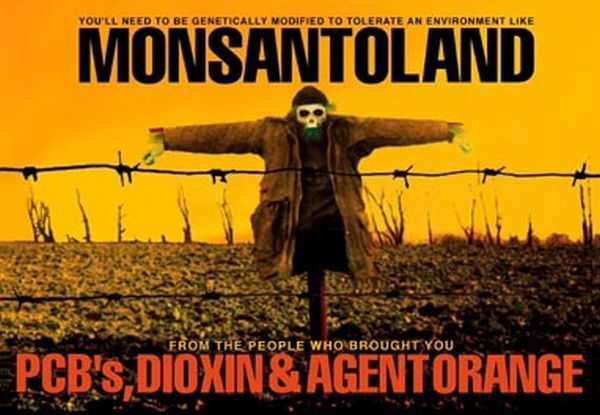
– Monsanto lobbyists to be placed in charge of food safety by Obama
– US Association of Physicians calls for Moratorium on GMO Foods
– Greenpeace: No need for condoms – GE corn can do the job
– Austrian Government Study Confirms Genetically Modified (GM) Crops Threaten Human Fertility and Health Safety
– The World According to Monsanto – A documentary that Americans won’t ever see.
– Life running out of control – Genetically Modified Organisms
– At stake is no less than control of the world’s food supply.
– BIODIVERSITY: Privatisation Making Seeds Themselves Infertile
– Biotech giants demand a high price for saving the planet
– Exposed: the great GM crops myth:
The biggest study of its kind ever conducted – the International Assessment of Agricultural Science and Technology for Development – concluded that GM was not the answer to world hunger.
Professor Bob Watson, the director of the study and chief scientist at the Department for Environment, Food and Rural Affairs, when asked if GM could solve world hunger, said: “The simple answer is no.”
GM food is all about profit and it kills you.
Aug. 13 (Bloomberg) — Monsanto Co., the world’s largest seed maker, plans to charge as much as 42 percent more for new genetically modified seeds next year than older offerings because they increase farmers’ output.
Roundup Ready 2 Yield soybeans will cost farmers an average of $74 an acre in 2010, and original Roundup Ready soybeans will cost $52 an acre, St. Louis-based Monsanto said today in presentations on its Web site. SmartStax corn seeds, developed with Dow Chemical Co., will cost $130 an acre, 17 percent more than the YieldGard triple-stack seeds they will replace.
“Our pricing has the flexibility built in to ensure the grower captures the greatest return from his seed investment, irrespective of market volatility,” Chief Executive Officer Hugh Grant said today in a statement.
Grant is introducing new modified seeds that boost yields as part of a plan to double gross profit from 2007 to 2012. The new soybeans, which resist Monsanto’s Roundup herbicide, produce 7.4 percent more soybeans per acre than the older version. SmartStax kills insects in multiple ways, reducing the amount of conventional corn that must be planted to deter insecticide resistance.
“SmartStax pricing is higher than we initially expected,” Vincent Andrews, a New York-based analyst at Morgan Stanley, said today in a report.
Monsanto rose $1.57, or 1.9 percent, to $84.03 at 4:15 p.m. in New York Stock Exchange composite trading. The shares have gained 19 percent this year.
Acreage Forecasts
SmartStax corn seed will be planted on as many as 4 million acres in 2010, its first year on the market, with a potential for as many as 65 million acres in the U.S. eventually, the company said. The new seed boosts yields 5 percent to 10 percent compared with other products, partly by reducing the amount of land that must be planted with conventional corn to 5 percent from 20 percent, Monsanto said.
Pricing for SmartStax is at the high end of expectations, Laurence Alexander, a New York-based analyst at Jefferies & Co., said by telephone.
Roundup Ready 2 Yield soybean seeds were planted on 1.5 million acres this year and will be planted on as many as 8 million acres next year in the U.S. with a potential to one day reach 55 million acres, Monsanto said.
The company is pricing its seeds to share the benefit of increased yields with farmers, said Mark Gulley, a New York- based analyst at Soleil Securities. Prices include seed treatments designed to protect seedlings from pests and disease, Monsanto said.
“They are in essence splitting the value of the extra yield 50-50,” Gulley said by telephone.
Monsanto repeated its forecast for earnings in the fiscal year that ends this month at the low end of a range of $4.40 to $4.50 a share. The average estimate of 16 analysts surveyed by Bloomberg was for profit of $4.41 a share.
To contact the reporter on this story: Jack Kaskey in New York at [email protected]
Last Updated: August 13, 2009 17:14 EDT
By Jack Kaskey
Source: Bloomberg